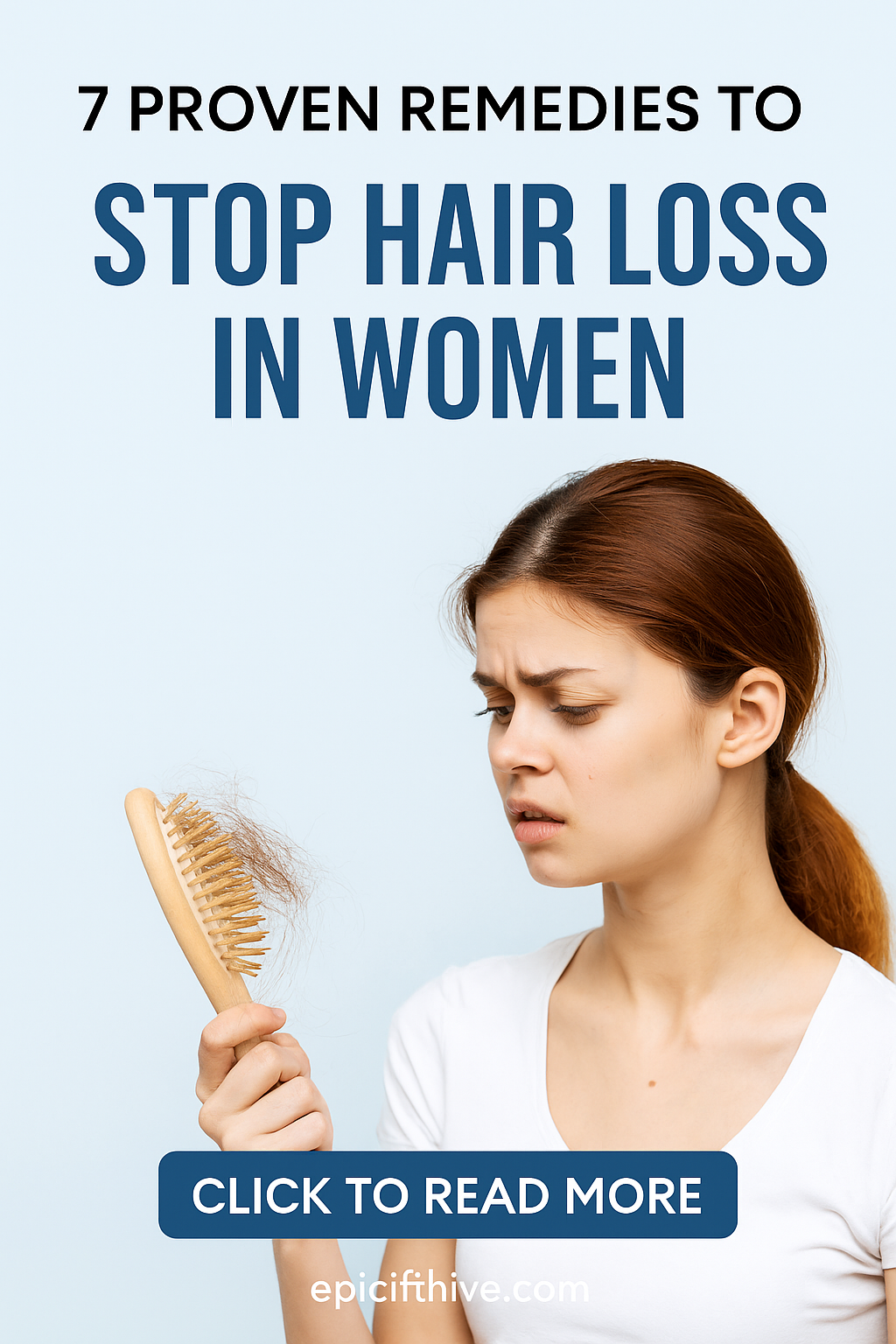If you’ve been brushing your hair only to find what seems like half your head of hair in your hands, you’re not alone. Hair loss in women is more common than most people think, and it doesn’t just affect women going through menopause. In fact, nearly 50% of women experience noticeable hair loss at some point in their lives.
In this blog post, we’ll dive into 7 proven remedies that have helped real women fight back against hair loss. Keep reading until the end—because the last remedy is often overlooked, yet shockingly effective.

1. Understand the Root Cause of Hair Loss in Women
Before diving into remedies, it’s crucial to understand what causes hair loss in women. The most common causes include:
- Hormonal imbalances (like thyroid issues or menopause)
- Nutritional deficiencies (especially iron and vitamin D)
- Chronic stress
- Genetics (female pattern baldness)
- Tight hairstyles causing traction alopecia
One powerful real-life story is that of Tamara Lucas, a 34-year-old teacher from Georgia, who noticed patches forming at her temples. A visit to her doctor revealed she had low ferritin (a type of stored iron). Within 3 months of correcting her iron levels, Tamara saw major regrowth.
2. Essential Oils to the Rescue
Using essential oils like rosemary, lavender, and peppermint has shown incredible results for hair loss in women. Rosemary oil, in particular, is known to stimulate circulation to the scalp and encourage hair regrowth.
A 2015 study published in Skinmed Journal even showed rosemary oil to be as effective as minoxidil (a drug used to treat hair loss) over a six-month period—with fewer side effects!
True Story: Blogger and mom of two, Michelle Benson, battled postpartum hair loss. She massaged rosemary oil diluted in coconut oil into her scalp three times a week. Six months later, her hair was visibly fuller, and her confidence was back.
3. Scalp Massage: The Simple Habit That Works Wonders
Scalp massages are an underrated remedy for hair loss in women. They improve blood flow to the scalp and help nourish the hair follicles.
A 2016 Japanese study showed that participants who received daily scalp massages had thicker hair after 24 weeks.
Example: Fitness instructor Laila Jones included scalp massages in her nightly routine using a wooden brush and noticed not only less shedding but new baby hairs appearing at her hairline after 10 weeks.
Pro Tip: Add a few drops of castor oil or tea tree oil to your fingers for an added boost.
4. Protein-Rich Diet to Strengthen Your Roots
Hair is made up of a protein called keratin. A diet low in protein can lead to hair loss in women, especially those following restrictive diets.
Include:
- Eggs
- Lentils
- Chicken
- Greek yogurt
- Tofu
Real Story: After transitioning to a vegan diet, Jessica Mendez experienced thinning hair. A nutritionist helped her add plant-based protein sources like quinoa and chickpeas. Within four months, she noticed thicker strands and reduced breakage.
Don’t underestimate the power of internal nourishment!
5. Avoid Heat & Chemical Damage
Overuse of flat irons, curling wands, and chemical treatments is a major culprit in hair loss in women.
True Event: Hairstylist Renee Holloway recalls a client who came in with severe breakage due to weekly straightening treatments. Renee switched her to a heat-free routine and protective styles. Over the next year, not only did the damage reverse, but her hair grew six inches longer.
To protect your hair:
- Use heat tools sparingly
- Opt for sulfate-free shampoos
- Deep condition weekly
Your hair will thank you.
6. Over-the-Counter and Prescription Options
If natural remedies aren’t enough, several FDA-approved treatments are available for hair loss in women:
- Minoxidil (Rogaine): Stimulates hair growth
- Spironolactone: Blocks androgens (testosterone-like hormones)
- Oral contraceptives: Sometimes prescribed to balance hormones
Case Example: At 29, Emily Grant was diagnosed with androgenetic alopecia (female pattern baldness). After a dermatologist prescribed minoxidil and spironolactone, she saw significant hair regrowth within 6 months.
However, always consult a doctor before starting medical treatments.
7. Stress Reduction: The Hidden Hair Saver
You didn’t expect stress to be on this list, did you?
Chronic stress causes cortisol levels to rise, which disrupts the hair growth cycle. This leads to telogen effluvium, a condition where large amounts of hair fall out.
True Story: During her divorce, Nina Wright experienced massive hair shedding. Her doctor attributed it to emotional stress. Nina began therapy, practiced yoga, and included meditation in her daily routine. Six months later, her hair stopped shedding and started regrowing naturally.
Managing stress can be as essential as any topical remedy.
Don’t Skip This: Bonus Remedy That Works for Many
We saved this for last because it’s so often overlooked…
Low-Level Laser Therapy (LLLT)
This is a non-invasive treatment using light energy to stimulate hair follicles. It’s FDA-cleared and has helped thousands combat hair loss in women.
Testimonial: Accountant Selina Adams, skeptical at first, tried an LLLT hair cap three times a week. After 4 months, her hair was noticeably denser, and even her hairdresser was shocked.
It’s not cheap—but it is effective for many.
Final Thoughts: Hope is Not Lost
Hair loss in women can feel frustrating, even devastating. But the truth is, there are more solutions now than ever before.
Whether it’s essential oils, laser therapy, or diet changes—there’s a remedy that could work for you.
Don’t wait to take action.
And remember: The last chapter isn’t written yet. Your hair can recover.
Frequently Asked Questions (FAQ)
Q1: What is the most common cause of hair loss in women?
A: The most common cause is hormonal imbalance, including PCOS, thyroid issues, or menopause. Nutrient deficiencies and stress also play a major role.
Q2: Can hair loss in women be reversed naturally?
A: Yes! With the right diet, lifestyle changes, and natural remedies like rosemary oil or scalp massages, many women see full recovery.
Q3: How long does it take to see results from natural remedies?
A: It usually takes 3–6 months of consistent application to see noticeable improvement.
Q4: Are supplements like biotin helpful?
A: Biotin helps if you’re deficient, but it’s not a miracle cure. Combining it with other remedies works better.
Q5: When should I see a doctor about hair loss?
A: If you notice sudden or patchy hair loss, or if it doesn’t improve with home remedies after several months, consult a dermatologist.
Encourage a Friend Today 💬
If you found these remedies helpful, imagine how many women are silently struggling without answers. Share this post with a friend, sister, or coworker.
Let’s build a community that uplifts each other—one strand at a time.
Want to Smile Before You Go?
Just remember: Even Rapunzel had bad hair days. But she never stopped growing.
